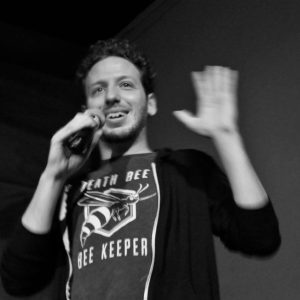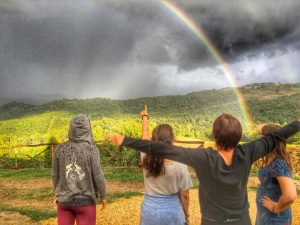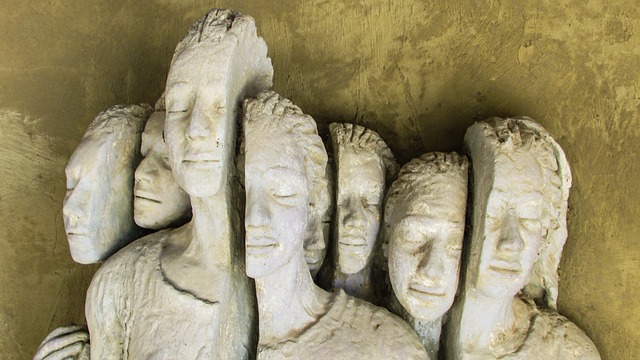By Daniel Elder
The searching faces of those who once had homes, now on the run or corralled into camps, their entire lives carried on their backs, are flattened on our screens. They once lived in homes. They lived in cities and in villages, raised their families in houses, on farms, in apartment buildings teeming with life. Their homes had roofs of concrete or brick or corrugated tin. They walked on floors of wood or parquet or mud. Outside their homes were gardens, flush with dates and lettuce and cucumbers and beans. Beyond the gardens wound roads that tied their homes to those of their neighbors. They stood up from planting in their gardens, from walking on their roads, from talking in cafes and squares, and looked up at the dollop-tops of minarets and listened to the plaintive calls of muezzins. This was before the punishing flights of MiGs came screaming overhead, before the chaotic staccato of ammunition became the soundtracks to their days, before the plumbing ran dry of water to drink. Before they fled. They once had homes: tapestries of languages and recipes, places of heart, woven out of scents and light, filled with stories formed of memory and tea.
My grandmother, Khana, survived the Nazi siege of Leningrad together with her three sisters and their mother, Maria. Leningrad was their home: a city of canals and boulevards, White Nights in June, the Hermitage and the Winter Palace, long and lively strolls down the Nevsky Prospekt. The rumblings of war built up slowly, buzzing from the radio antennae. And then the border was breached, the pact was broken, and the pincers of the Wehrmacht bore down, the Luftwaffe screaming overhead, pounding concrete and flesh into submission. Legions of dreaded Panzer tanks encircled the city, with no way in and no way out. Boris, Maria’s husband, the girls’ father, was a Soviet believer. He was sent to the front, to the city perimeter. He never returned. My grandmother, barely twenty years old, watched the skies while foraging for scrawny grasses that grew through cracks in the street, her whole being filled with fear of the bombs that had killed her father. When food ran out, her family boiled wallpaper glue into soup, with leather belts added for flavoring. Her mother’s belly grew distended as she starved herself to ensure her daughters would live. Leningrad was home, but home was now just survival, day after day, until after more than two years our family was at last evacuated on The Road of Life, away from home—and to safety instead.
Thirty years later my mother, Ella, Khana’s daughter, packed three suitcases and left home. She was born in Siberia, spent her childhood on a collective farm, but home was Leningrad, our family’s city, to which she returned, where she lived with her aunt Mila. For my mother, Leningrad was theater and music and literature. Leningrad was culture; Leningrad was life—Pushkin, Gogol, Akhmatova, Mayakovsky, The Master and Margarita, The Church of the Savior of Spilled Blood downriver, its peaks and roofs like frosted candy. She studied at the Herzen Pedagogical Institute, learning English. With her classmates she went to dachas outside the city’s perimeter—now long free of siege machinery—and drank vodka by the forest’s edge. But they were still under siege; this was as far as they could get.
Looming over all their lives was the ever-present Soviet state. Leningrad was a city haunted by the ghosts of Stalin’s purges. No longer in such numbers, but people were still being sent to labor camps or simply disappeared. People lived, but they lived crowded into tenements and lining up for bread. The students listened to the BBC and Voice of America in basements with friends, and my mother translated Beatles lyrics into Russian, painting pictures with words of a world beyond their borders. When Jews began to flee the USSR in the 1970s, my mother won a hard-fought visa. She packed three suitcases. One had books, one had clothes and tchotchkes, and the third had a blanket and a pillow. Everything else, she left behind—her mother, her brother. Everything.
From Russia, Jews fleeing the USSR went first to Vienna or to Rome. My mother landed in that storied Italian city with her three suitcases. She accepted food from generous Hare Krishnas and saved her lira to spend on cappuccinos that cleansed her mouth of Stalinism. She wandered the shops, touching all the objects that felt like they held history. She wandered museums and marketplaces, connecting to a shared humanity. She waited for her visa to be processed, to be sent onwards to a home she had not yet found. The Jewish Agency wanted to send her to Israel, but it was America that called to her, New York that beckoned her, and she would settle for nothing less. She was drawn there, drawn to its light. It was a place, she knew, where a strong woman could stand with her torch raised in the night.
My father, Sasha, took a job as a doctor on a merchant marine ship setting sail from the Baltic Sea in 1972. He skipped rope each day on the deck, keeping his legs fit, keeping his lungs and heart ready. He tried to keep his head down, tried not to draw attention to himself. He had drawn enough already—he’d been involved in anti-communist activities back home. Home, the USSR, was a dead end. After his ship docked in the Ivory Coast, he broke away from his crewmates while they window-shopped, and he bolted. The highest ranking of these crewmates was equipped with a sidearm for handling situations just like this one, so my father ran like hell for the American embassy, where he pled for political asylum. When he arrived at last in America, he spent the first week hiding each night under the kitchen table with a baseball bat, unable to sleep, waiting for the KGB to come for him. He had left his enemies behind, and here he found friends instead. He found people willing to help him. He built a life. He heard my mother speaking Russian in the lobby of a New York City movie theater, while they both waited in line to see Ingmar Bergman’s The Seventh Seal.
Our mother and our father were the first to come. Their brothers and sisters and parents and aunts came later, after our parents had met and married. Our parents left the Soviet Union with next to nothing in their hands, leaving behind every old and familiar idea of home for the infinite but frightening promise across the sea. And while their flight was in a sense chosen, not as frenzied and chaotic as our grandmother Khana and her family fleeing bombs in jeeps across frozen lakes amid the rat-a-tat of anti-aircraft batteries, there was urgency in their flight nonetheless. When my mother boarded that plane, when my father ran for the embassy, it was life or death that was in the winds at their backs. Their new chosen home opened its arms to them. The roads were not, perhaps, paved with gold, but they found safety, promise, a place where they could raise in security and comfort three gifts as yet unknown to them: my sisters and me.
My sisters and I, we live in homes. We stream movies online, we fold our laundry, pet our cats. We make tea in our homes and wear robes and swim in endless information at our fingertips. Our homes are filled with friends who come and go with laughter and with hugs. Our homes are full of promise. We owe everything not just to the people, our parents, who picked up their lives in their hands and carried them into the unknown, but to the unknown itself, which welcomed them, which rewarded them for their bravery by being for them exactly what they had given up—home. My sisters and I buy cheese and wine. We hire taxicabs. We go to the theater and take vacations. We eat at our grandmother Khana’s table, her oily pancakes, and we try to understand her life, what it would be like to live in fear of bombs. Nothing in her gentle, loving nature feels like war has shaped her. Or perhaps that’s exactly how it has. We try to put ourselves in our father’s shoes on the deck of the ship, or imagine ourselves at the airport with our mother’s three suitcases, our entire lives held in our hands.
The faces we see on the TV, walking from country to country, the ones clinging to the sides of boats, the human beings fleeing all they know: they once had homes. Their walls were not strong enough to hold the world at bay. Their homes disintegrated in man-made storms of dust and smoke. If we look, we can find the detritus and fossils of their homes, the blown out shells. All we need to do is follow the breadcrumb trails they have left us: suitcase trails, fallen wounded trails, dead and dying children trails, stretched across continents. Their gardens were uprooted. Bright-eyed boys and girls torn from the soil that held them: we can read about them; we can look at their photos, even watch the skeletons of their homes streaming live on our computers as cluster bombs flicker in the streets and alleys, chasing the stubborn who cling to their lives, the ones who couldn’t, or simply wouldn’t flee. Meanwhile, the rest wander abroad, from border to border, in search of someplace to call home. Look and you can see them, standing just outside our homes.
*This essay originally appeared in the Spring 2016 “Borders” Issue of Origins Journal



Get ready to connect to your joy, manifest the life of your dreams, and tell the truth about who you are. This program is an excavation of the self, a deep and fun journey into questions such as: If I wasn’t afraid, what would I do? Who would I be if no one told me who I was?
Jennifer Pastiloff, creator of Manifestation Yoga and author of the forthcoming Girl Power: You Are Enough, invites you beyond your comfort zone to explore what it means to be creative, human, and free—through writing, asana, and maybe a dance party or two! Jennifer’s focus is less on yoga postures and more on diving into life in all its unpredictable, messy beauty.
Note Bring a journal, an open heart, and a sense of humor. Click the photo to sign up.
